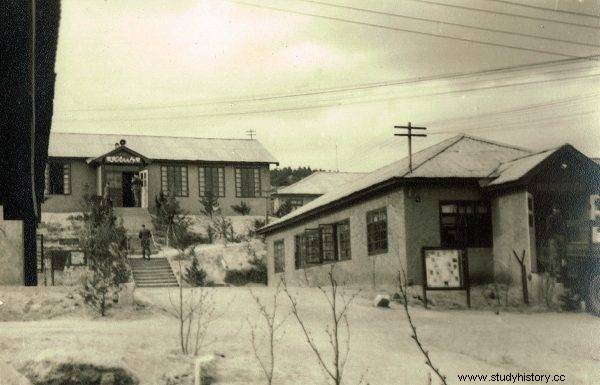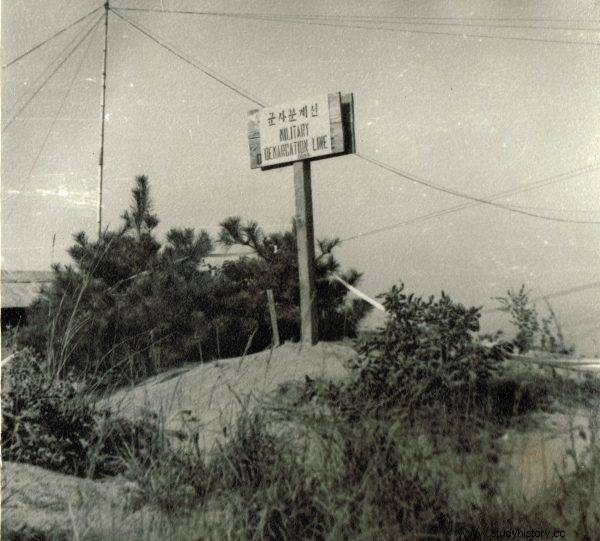Americans kidnapped Polish translator in Korea! Or maybe he escaped himself? Our delegation in the Neutral States Supervisory Committee is shocked - no one expected such a turn of events. The suspects accuse the Poles of a lie, and the Poles do not remain indebted. After all, he just wanted to be free ...
In 1953, the Korean War ended - the first round of the Cold War. Neither side was satisfied. In order to force them to comply with the provisions of the armistice agreement, the Supervisory Commission of Neutral States in Korea was established. It was to consist of representatives of four countries - two to be chosen by each opponent. The USA, along with the UN forces, invited Sweden and Switzerland, North Korea and the command of "Chinese volunteers" - Poland and Czechoslovakia to the commission.
Verification successful
When Jan Hajdukiewicz was summoned by the Party Committee on the morning of June 24, 1953, he did not know what awaited him. The official asked him biased questions, to which Hajdukiewicz replied according to the line of the authorities. He could not otherwise - the very fact of remaining a nonpartisan bachelor condemned him to many inconveniences. Two days after the interrogation and the secret police's visit to his apartment, he was to appear again at the communist headquarters in Łódź. There he was notified that he was assigned to the Korean commission as an interpreter.
Jan Hajdukiewicz was informed about the type of mission and about the division of Poles into three teams. The first was to be stationed in North Korea, the second in a demilitarized zone, and the third - in South Korea. Hajdukiewicz linked his hopes for freedom with the third zone:
My chance is 1:3, I thought. Suppose I travel to South Korea. Will I then have a chance to escape from the communists, communists who made Poland an unbearable place of residence for a truly honest man?
However, he was assigned to a demilitarized zone. It was probably due to his nonpartisan nature.
On the way
The journey began in Warsaw. On the station platform, the Chinese and North Korean ambassadors gave their speeches:"Your work will contribute to the work of peace." After these words, the train left for the Soviet border, where the train was changed.
The Polish delegation traveled by a modern, blue and white train consisting of three sleeping cars and a restaurant car. Quite it soon turned out that it is not a typical Soviet train, but a war booty from World War II. When it stopped at Soviet stations, it was a contrast to the rest of the trains waiting at the stations. During these stops, Poles were not allowed to speak to anyone - they received a warning from Col. NKVD:"You were only allowed to cross the Soviet Union, not to talk to the population!".

The USA, along with the UN forces, invited Sweden and Switzerland, North Korea and the command of "Chinese volunteers" - Poland and Czechoslovakia to the commission.
Hajdukiewicz, although he was aware that "official knowledge of the Soviet Union" as a country flowing with milk and honey is one big lie, was not prepared for the poverty of the Soviet landscape:
Though the weeds grew abundantly, the same could not be said for life. The wide spaces remained unsettled. Only a few cattle were visible in the vast fields and meadows. Only once have I noticed agricultural machinery and in quantities that are completely insufficient for mechanized cultivation role in such vast spaces. On the other hand, there were many peasant huts - dilapidated and dilapidated. They gave a clear picture of poverty, the most essential factor in Russian reality.
The journey of the Polish delegation through the Soviet Union was relatively calm - except for a few incidents. Several times their train was thrown with stones when the inhabitants of the Soviet Union found out that Poles were traveling in the train.
Welcome to Korea
On the border with Manchuria, the delegates once again changed their composition - and this one proved to be convenient. Together with the Soviet train, the NKVD officers accompanying the delegates from the beginning of the journey departed. Hajdukiewicz reached Korea after twenty days. He was assigned to a demilitarized zone. He sat idle for a week, waiting for further instructions and thinking about his assignment:
I have traveled almost the entire territory of the communist world without committing any foolishness to suspect me. And here I am on the threshold of a different, happier world who is still as far away from me as the moon.

View of the Polish camp in Panmunjom, around 1955
One day an officer called an interpreter:"The orders have been changed." Hajdukiewicz was assigned to work in South Korea. His first answer was no. In this way, he wanted not to arouse suspicion. He said he could work in Panmunjon or in the North, but not with the Americans. After this reply, the officer was sure that Hajdukiewicz was the right person to send south.
With the new assignment in Hajdukiewicz, escape plans were revived. He only wondered if he could apply for asylum as a member of the Neutral Nations Supervisory Commission delegation. He did not know whether the Americans would help him in this situation or whether they would have to inform his superiors about the request he would make to them.
Escape or…
While serving in the commission, Hajdukiewicz was sent to political training. During it, he fell in love with Polish comrades. He spoke poorly about the collectivization of agriculture and mentioned the important role of religion in the state. Only after the reprimand of the commander he realized his mistake.
A few days after receiving the admonition, on September 9, 1953, Hajdukiewicz was ordered to leave Seoul. In the morning, Polish comrades Elikus and Golonka came for him. On the way to the airport, the translator realized that this was his last chance to escape from behind the Iron Curtain:
The plane has landed. I was approaching the ramp. The door of the plane was already open. I stared in horror at the open cabin, realizing only one thing. Crossing the cabin's threshold is tantamount to my execution.

A board informing about being in the Military Demarcation Line between North and South Korea.
Hajdukiewicz headed for the cabin, until at some point, as if taken out of a dream, he said to one of the Americans who were the crew of the plane (only the USA had air transport in this area): "Can you assure me that in case of staying here will I be granted asylum? ” . The answer was yes. The interlocutor quickly gave the Pole instructions:he ordered Hajdukiewicz to get into a car driven by an American gendarme. Polish comrades only managed to shout:"What are you doing?" However, he was already in the car away from the airport…
They took our interpreter!
The Polish commander of the delegation to the Supervisory Committee of Neutral States in Korea, General Wągrowski, wrote a letter to the Commander-in-Chief of the United Nations Army, in which he stated that the Polish translator had been abducted by the Americans:
[…] Jan Hajdukiewicz was at the airport, waiting together with another Polish member of the Inspection Group, Major Golonka, for the departure of the plane who rhyme both were to return to Panmunjon for the KNPN meeting. Shortly before the take-off, Major Golonek saw a jeep standing nearby, in which he spotted Jan Hajdukiewcz, assisted by a Polish MP and an American captain.
When Maj. Golonka, surprised by this, went to the car to find out what had happened, the MP soldier set the machine in motion and drove away very quickly . This jeep was followed by another one in which Major Golonka and Hajdukiewicz's luggage was stored. After about 10 minutes both jeeps returned to the airport, bringing my luggage back. Pork knuckles. Jan Hajdukiewicz never returned.
On request at the airport at that time member of the Neutral Countries Inspection Group, Lt. Col. Fileus, addressed to the liaison officer:"What happened to Hajdukiewicz?", The liaison officer replied that he did not know. Any further protests of Lt. File with the local US military authorities and demand that it be returned Jan Hajdukiewicz's return had no effect.
The American side replied to the allegations presented in the letter on September 15, 1953:
[...] allegation made by the Polish Delegate to the Neutral Nations Supervisory Committee that the Polish translator Jan Hajdukiewicz was kidnapped by the staff of the United Nations Command in Kannyna on September 9, 1953, is completely false.
It is clear from statements made by Jan Hajdukiewicz in the presence of witnesses at the time he asked for asylum and at a public press conference, that he had asked for asylum by the United Nations Armed Forces voluntarily and that he had planned this venture before leaving Poland.
For a long time, the authorities of the Polish People's Republic tried to convince the world that the Americans had kidnapped Hajdukiewicz. They did not pay attention to his public appearances, in which he repeatedly emphasized that he had given himself completely voluntarily under the wings of "rotten capitalists". Since then, the personnel of the Polish delegation in Korea has been selected more carefully. In addition, more attention was paid to any ideological deviations among the delegates and Poles were ordered to submit any cooperation proposals from Western countries.
